Beethoven: Fidelio (Haitink)
Introduction
Beethoven's only opera went through several revisions and caused a huge amount of stress for the composer before achieving the success he had wanted for it. His great work, with the central messge of 'freedom for all' was premiered in 1805, in a Vienna which was then occupied by France, and so was received a little coldly to say the least.
A year later, it was shortened to just the two acts, and another overture had been written for it. Eight years later, more revisions were made (together with yet another new overture) and the work became an instant success, and was seen by the great and the good, including a seventeen year old Schubert.
The story (truncated within this description) is set in the late eighteenth century, in a Spanish prison just outside Seville. Florestan has been imprisoned by the corrupt Don Pizzaro, and has little or no chance of reprieve.
His gaoler is a slightly less heartless man named Rocco. Rocco has a daughter, Marzelline, who has fallen in love with Rocco's assistant, Fidelio. This hasn't gone down at all well with Jaquino, who has always thought he would be the one to become Marzelline's husband.
Jaquino doesn't have much to worry about however, as Fidelio is actually Leonore, Florestan's wife, who has disguised herself to find her husband whom she suspects has been imprisoned there.
Rocco passes on a message to Pizarro, saying a minister will be arriving very soon to investigate allegations of corruption. Pizarro cannot be caught with Florestan in his cells, and decides to murder him and bury him before anyone finds out.
Leonore begs Rocco to allow the prisoners some daylight and fresh air, a request to which Marzelline is happy to use her daughterly skills on her father, yet Leonore only wants to find her husband among them. Rocco agrees, yet is caught by Pizarro once they are out of their cells. A celebration of the King's birthday is the only excuse Rocco can come up with, but is accepted by Pizarro, albeit very reluctantly. Pizarro can, after all, take out his anger on the man who is due to die that evening.
Florestan is asleep when Rocco and Leonore enter the cell to dig his grave, but wakes fairly sharpish and Leonore recognises him as her husband. She persuades Rocco to give him some water and a bit of bread without allowing her real identity to slip before Pizarro appears. He ushers the other two away before revealing himself to Florestan as the captor who has held him for two years. Florestan accuses Pizzaro of murder, but Pizarro has only one thing on his mind.
Leonore jumps between Pizzaro and Florestan letting all know who she really is. Pizarro tries to stab her as well, but Leonore pulls a gun on him at the same time the trumpet heralds the arrival of the minister.
Pizarro is led away to be punished, the husband and wife are reunited, and Marzelline is suitably shocked about (yet probably accepting of) hearing the news. General rejoicing is had by all.
Audio and Video
Some blotchiness within the darker scenes (and there are many) spoils the impressive lighting of the set designs, yet the clarity of the close-ups are also a bit of a let down as they reveal the make up in all its glory - perfect for viewing from a distance, but looking a complete mess when the camera is in your face.
Sound-wise, things are much better, yet there are moments where I felt that some less-than-subtle microphone twiddling was being done to manage some of Beethoven's heavier orchestration in favour of the voices. Often, we lose a lot of the more intricate detail of the melodic lines within the orchestra, yet all of a sudden, the band is to the fore again and the vocal detail is lost.
Whatever the perceived problems, the overall balance is very good and the Zurich Opera Orchestra come across as an excellent ensemble.
Overall
This is one of Bernard Haitink's favourites, and there's no denying the passion involved in recreating the music yet again, but perhaps there could be a little more excitement overall. Everything seems a little 'careful', and even the familiar Leonore III overture in the third act appears more genteel than it should, however brilliantly played.
But!...the flow of the piece if much improved by the removal of some of the dialogue, and there's no denying that this a very stylish, if not necessarily 'classical' interpretation.
The singing is certainly not classical, by which I mean the voices are those you would be more likely to hear in music written a few decades later but seeing as Beethoven had written vocal lines that would stretch even the best singers and orchestrated rather heavily in places, it's probably necessary to up the ante a bit.
Leonore/Fidelio is almost certainly one of the most demanding female roles, and in Melanie Diener we have someone with a powerful, yet very beautiful voice that comes a little unstuck in the Act I Aria 'Komm, Hoffnung, lass den letzten Stern', but lasts the distance well.
Roberto Saccà (Florestan) has an easier time of it all, only appearing in the second act, yet is ons stage continuosly. He has a fine lyric voice, which suits the opening 'In des Lebens Frühlingstagen' down to the ground.
Alfred Muff (Rocco) is a popular singer in Zurich and his Wagnerian-tones are well suited to Rocco's music, and there's no doubt that Muff's characterisation shows the man to be a gaoler with a heart.
Lucio Gallo (Pizarro) is dressed up like a Mafioso, and snarls his way through the role, trying his best to appear evil, but I'm afraid it's all a little too cartoonish for my liking.
The Zurich Opera House boasts an excellent chorus and the men put on a good show for 'O welche Lust' , being joined by the rest for one of the most beautiful final sections I've heard for a long time.
The sets, designed by Ezio Toffolutti are outstanding, giving the impression that the prison is an Escher-esque never ending series of stairs and broken bridges leading to the depths of somewhere very horrible.
Overall then, a very satisfying performance, expertly and compassionately directed by Haitink. No extras though, which is quite disappointing.
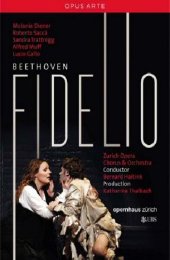
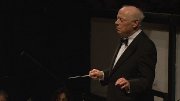
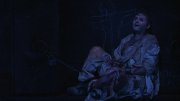

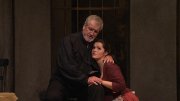

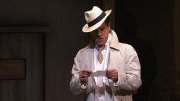
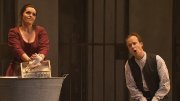

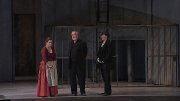







































Your Opinions and Comments
Be the first to post a comment!